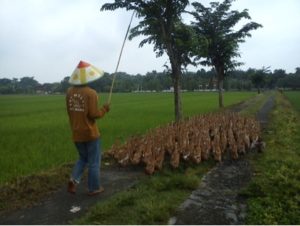Many years ago I travelled to Indonesia and enjoyed the wonderful landscape, people and culture. It has been said many times that travel broadens our horizons – it also provides different experiences when compared with the ones we grow accustomed to at home. It opens our senses to new sights, new sounds, new smells and so much more. It also opens our minds to think in a new way.
I have recently been sharing a story and metaphor from my time in Indonesia, as it relates to leadership; a topic I have been researching for many years
If I can paint a picture of rural life on some of the islands it can be a beautifully cultivated place with terraced watery rice fields that glimmer in the sun, whilst the rich green shoots of the new rice grow, gently waving in the gentle breeze. A very archetypal picture of that part of the world. So lush, so tranquil, so calming.

Once the rice is harvested the fields are left to dry. The stubble looking very much like most farm fields, such as corn or wheat fields, which have had the crop removed. It is at this stage that often, large flocks of ducks are brought along to graze during the day. As we know ducks can be very ‘talkative’, quacking and nibbling their day away. And they are certainly very happy in the stubble of the rice fields seeking out tasty morsels, overseen by their very own duck shepherd.
At the end of each day the duck shepherd takes the ducks back home to a secure compound to make sure that they are safe overnight from predators. Often the compound is a distance away so the ducks need to be taken from the field back home, frequently along a road.
It is fascinating to watch this activity as the duck are encouraged off the field and stay together as one flock. Ducks have a wonderfully proud way of waddling – head held high, walking purposefully forward. It is this way that they head off the field.
Now this is the interesting part as the duck shepherd follows behind, carrying a very long cane that you may just see in the picture. This is not to beat the ducks with, it is used to gently guide them. So if you can imagine in this picture that the ducks are walking forward at a reasonable speed – if any of the duck stray from the route the cane is lowered on the outside, the duck shepherd gently tapping the ducks back into the group, the duck barely noticing anything. If the shepherd wishes them to go faster, the shepherd speeds up from behind and the rear ducks start nudging the ones in front, who in turn speed up. It is amazing to see the way the ducks are controlled – or perhaps I should say led, albeit they are led from behind. From this vantage point the duck shepherd can keep on eye over the flock, look into the far distance to assess the longer journey and also focus on the middle ground – now you can’t do all of that from the front.
For me this is a brilliant example of a skilled leader, yet in this case the leadership is from behind. Quite the opposite we hear so much about. The pictures of leaders are often to be seen on the front of business magazines or the pages of the business newspapers. Yet are these the best leaders?
When the ducks near the compound the duck shepherd will move to the side and then to the front to direct the ducks exactly where the shepherd wants them to go. A neat switch from leading from behind, to leading from the front; or situational leadership.
Now that is great leadership, albeit all too frequently the best leadership is assumed to be highly visible.
I remember a quotation from Lao-Tzu, the Chinese philosopher from c.500BC:
“As for the best leaders, the people do not notice their existence. The next best the people honour and praise. The next the people fear, and the next the people hate. But when the best leader’s work is done, the people say “We did it ourselves”.”
So whilst the leader who acts like a duck shepherd will not have their picture splashed across the media on a regular basis, they tend to be more successful. In our celebrity status obsessed, extroverted world, the quiet yet brilliantly effective leader is not noticed anyway nearly as much as the less effective and ‘noisy celebrity’.
Now if you want sound research to support this do get in touch.
So one question: How do you lead?
My best wishes,
Peter